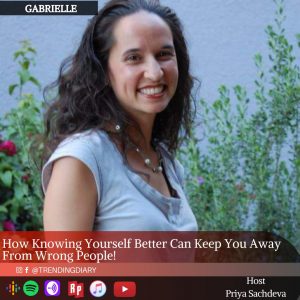Human Psycology, If some ask me to read about it or even have a knowledge about the same. I would have consider the person fool.
One Of The Crucial Skill We Can Master over The Year is to get a better understanding Of The people we meet and interact in our personal life. And ever hardest Part To Understand Your Self Better. To Get a sense of being.
Though It Sound Easy said than Done?
But If You can Master It? What if you can literally understand the ART!
Okay What is the most crucial aspect in Business or Personal Life?
What is the one thing that creates a difference between your success and failure? In personal relationships, what can be the difference between pleasure and frustration?
Knowing exactly what to do for the people that you are with is a priceless life skill that everyone deserves to learn and everyone has the opportunity to master.
In the new episode listen to Gabrielle who specialize in personality profiling and communication coaching.
Building healthy personal relationships and understanding People in life is the foundation for fulfillment and sometimes a basis for success.
But What takes you one step Closer to Success?
In the new episode on Trending Diary with Gabrielle we have not only understand The HUMAN PSYCOLOGY or some aspects of HUMAN BEHAVIOUR but This lead to great change in the perspective.

Host: You have studies A lot by humans, so what do you think makes one sapien special than the other?
Gabrielle: We’re all special. “Special” just means unique in a valuable way. So we all have inherent value. But all scientists agree that nurture is equally as important as nature. So our personal experiences are all very different. Even if we go through the same thing as someone else, our personality makes us respond to it differently. When we have a lifetime of various experiences, the way our personality responds to them and the things that we learn from those experiences add up to who we become.
There are 16 different personality profiles, which is a wide variety of unique perspectives. But things like national culture, family dynamics, social influence, and religious influence all change how our personality is displayed. Then the quality of our soul (in generosity and honesty) is going to ultimately determine how we manifest our special gifts, talents, and strengths.
Knowing your personality is vital to begin the process of manifesting your special individuality. It gives you permission to be and do who and what you truly think and feel and are. That is going to extend to the people around you, even if only in an indirect way; by extension. Here Human Psycology Plays a Great Role!
Host (Priya Sachdeva) – According to you, when the journey of understanding yourself began and how does it evolve?
Gabrielle- It began, for me, when my father told me about being honest with myself. I was already going to a religious establishment that constantly reminded me that honesty is the only way to find true happiness. But honesty has to start with yourself before it can extend to anyone or anything else. Human PSycology is an infinite subject.
You can only understand something or someone when you are both mutually honest with yourselves and each other. So that demands a very high standard of behavior, in addition to the ability to accept unpleasant things and experiences. But accepting something is not the same as approving of it! I learned, very generously, from people who had high standards, without hypocrisy.
They practiced what they preached and adhered to the philosophy of:
“let the one who has no sin throw the first stone”.
That meant that they were constantly working hard to be better people. That kept them very busy and too occupied to be judgmental. And humility was the only way that they were able to be honest with themselves and each other.
It evolves over time when a person becomes stronger and more wise; insightful. There are things that the “big picture” will reveal. The thing that is done in response to that insightful revelation is the real key to understanding. Because understanding demands acceptance of reality. Not agreeing with the thing being said/done, but accepting that it WAS said or done, in order to respond in a proactive way, not a reactive one. Rather than Reading Books on Human Psycology literally get on the crowd and try to understand them.
Host- How does one differentiate between a healthy Relationship and the one that creates toxic emotions around you?
Gabrielle- By, again, an ability to be honest with yourself, first, and then with others, demanding a high standard for behavior. A relationship has to be mutually beneficial and equally constructive for both individuals involved.
There are easy ways to determine what is beneficial and constructive.
Things like positive emotions and healthy behaviors are obvious ways to determine that something is beneficial and constructive, in and of themselves. But then again, things like the energy that is generated in the people as a by-product (the people around the people interacting) becoming better people as a side-effect.
The fact is, there’s no such thing as “neutral” energy. Every action has an equal and opposite reaction in response to the original action. So if you’re not creating a positive effect, you’re propelling a negative energy. When you take an inventory of yourself and others, just honestly look at what effect you (or the other person) have created.
People and things are either better or worse after interacting with you—and others. Are you becoming better after interacting with this individual? Or worse? Is the other person becoming better after interacting with you? Or worse? There is no grey. It’s very black or white.
Negative emotions are not toxic. They are very important. The toxicity is about how the emotions are responded to; in a reaction of behavior.
Again that’s also a Human Psycology.
HOST- What I have observed is that there are a lot of expectations whenever we are connected with someone. And make it more transactive. So how we can embed a sense of giving or embed a sense of value in it.
Answer- By modifying our definition of “giving”. Most people think that giving is, inherently, taking away something from yourself. But true giving is benevolent, and therefore, supplies us with something symbiotic. What we “get” from the experience of giving is something of quality; not quantity.
It’s not something that can be measured or compared with something else. That would be an amount that someone can judge. But the things in life that are the most important are the things that can’t be measured or judged or described. Like trust Or appreciation, respect Or love.
How can you put a value; a number, on those kinds of things? They are not physically manifested the way external, physical things are. The truly genuine “giving” interactions that people have with each other are invaluable; priceless, so there is no expectation of physical compensation or return for the act.
Thoughts and feelings are the only things that really matter in life, because they are the things that add quality to our life. That’s not something that can be compared to anything else. Our humanity is very distinct in that way. And very complex.
HOST- What is the communication mantra you follow in your life?
Gaberille- Always listen twice as much as you speak. Period. The only way we can do that is if we learn the language of the person that we’re listening to. That way, when it comes to be your “turn” to speak, you will be more proactive and more generous in the way that you express your thoughts. You have to be totally and completely honest at all times. But you always have to convey your information with a mild temper and deep respect.
That means you have to be in a good mood when you’re interacting with someone. You have to make sure that your energy is, not necessarily completely positive, but always proactive. There are times when you have negative emotions. But if your philosophy is based on generosity, then it will demand that you have the discipline to listen more than you speak.
It will also demand that when you are being honest, you will be humble in the way that you view yourself relative to the person that you’re communicating with. You will have a perspective of accountability.
That demands responsibility. That’s based on the ability to be responsive.
That can only happen if you’re paying very close attention to what was said. And also motivate you to ask questions, in the event of confusion or negative feelings. When you ask questions, you avoid unnecessary misunderstanding. Then, about 80% of the arguments that would have otherwise transpired will never happen. And respect will be created. And trust will continue. Because appreciation will be at the foundation of the relationship.
Host- What is the one trend you want to see more evolving in the new era?
Gaberielle- Willingness to learn about individuals; sacrificing the time that we would otherwise spend doing things with our technological machines. That includes rebuilding and fortifying our genuine interest in people. Technology is undermining our trust in each other. It’s taking away the accountability for the things we say and do. It’s encouraging division, in our casual social interaction as well as the important relationships.
When I see a family in a restaurant with their phones out, it breaks my heart. I know that parents don’t know how to talk to their kids anymore, because they literally speak a different social “language” based on not interacting directly with each other. Communicating with the people who mean the most to us demands eye contact, tone of voice, gestures, and touching.
Covid19 is making that more difficult, yes. But it’s just propelling something that started a long time ago; avoidance. People just don’t want to spend the time and put forth the effort to be together, because it’s intimate and honest.
I would love it if people would say that the people in their lives are “worth” the time that they would otherwise be spending in the pursuit of money and power. Just put your phone and computer down and look at the person you’re talking to. Learn how to talk and listen again, even if that means starting from the beginning of getting to know the person you’re with—truly getting to know who they are as an individual.
Listen The Full Episode on SPotify, Apple, Google Podcast.
And share You Favorite facts About Human Psycology in The Comment below.


Temp Mail I am truly thankful to the owner of this web site who has shared this fantastic piece of writing at at this place.